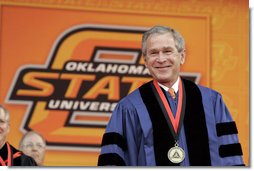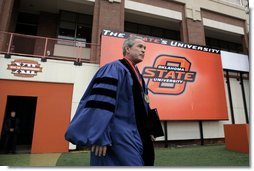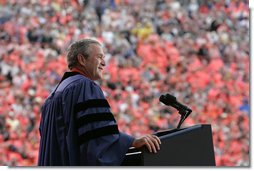
- Afghanistan
- Africa
- Budget Management
- Defense
- Economy
- Education
- Energy
- Environment
- Global Diplomacy
- Health Care
- Homeland Security
- Immigration
- International Trade
- Iraq
- Judicial Nominations
- Middle East
- National Security
- Veterans
|
Home >
News & Policies >
May 2006
|
For Immediate Release
Office of the Press Secretary
May 6, 2006
President Bush Delivers Commencement Address at Oklahoma State University
Oklahoma State University
Stillwater, Oklahoma
10:10 A.M. CDT
THE PRESIDENT: Thank you all very much. President Schmidly, thank you. Members of the Oklahoma State faculty and administration; Governor; people in the Statehouse; members of the United States Congress; distinguished guests; parents, friends, family, and most important, the Class of 2006 -- (applause) -- thanks for the warm welcome to this great state, and to this fine campus. I'm honored to be here. (Applause.)
 Laura sends her greetings, and she's disappointed that she couldn't
be here with me. She was even more disappointed when she found out I
had planned a romantic dinner for two -- at Eskimo Joe's. (Applause.)
She also said she had one question to ask the students here today: How
Orange are you? (Applause.) If you read the papers, you know that when
some want to criticize me, they call me a cowboy. (Applause.) This
cowboy is proud to standing here in the midst of a lot of other cowboys.
(Applause.)
Laura sends her greetings, and she's disappointed that she couldn't
be here with me. She was even more disappointed when she found out I
had planned a romantic dinner for two -- at Eskimo Joe's. (Applause.)
She also said she had one question to ask the students here today: How
Orange are you? (Applause.) If you read the papers, you know that when
some want to criticize me, they call me a cowboy. (Applause.) This
cowboy is proud to standing here in the midst of a lot of other cowboys.
(Applause.)
I want to thank the moms and dads here for the sacrifice and for the love you've shown your children. (Applause.) I want to thank the faculty for your hard work and dedication. (Applause.) I congratulate the Class of 2006. (Applause.) Some of you are graduating with honors that involved much sacrifice and achievement. Others perhaps spent a little less time in the library. (Laughter.) For all of you, I bring a message of great hope: There's life after English Comp. (Laughter.) Someday you'll appreciate what you've learned here, you'll make your teachers proud. I know the professors who taught me English marvel at my way of words. (Laughter.)
The last few months before graduation are busy ones. Amid all the excitement, there's one thing that probably eluded a few of you: You haven't had time to find a job. I speak for your parents when I say: Now is the time to start looking. (Applause.) Some good news for you: The job market for college graduates is the best it's been in years. (Applause.) The economy of ours is strong and so you'll have more jobs to choose from than previous classes, and your starting salaries will be higher. (Applause.) And the opportunities beyond are only limited by the size of your dreams.
You're privileged to live in the world's freest country at one of the most hopeful moments in human history. Soon you'll leave this university, you'll take your place in our society. And as you do, you'll witness dramatic changes, and these changes will present you with opportunities and choices and great challenges.
Your generation will enjoy unimagined opportunities because of education. You know, when this university was founded in 1890, it was called the Oklahoma Territorial Agricultural and Mechanical College, one of the nation's land-grant colleges. And the investment has paid off many times over. Some of the old-timers remember that after the Dust Bowl hit Oklahoma in the 1930s, this university responded by helping the farmers and ranchers with innovative soil conservation techniques. OSU is still committed to the land-grant mission of high-quality teaching and advanced research and outreach to the communities it serves. But the school has moved far beyond its original focus on agriculture, and Oklahoma State University is now a comprehensive public university with eight degree-granting colleges that offer more than 350 programs to more than 21,000 students.
 This fine university has adapted, and to succeed in the 21st century,
you're going to have to adapt, as well. Your degree marks the
successful end of your undergraduate education, and when you leave this
university, you're going to enter a dynamic world and an economy that is
constantly creating new opportunities that will require you to learn new
skills. I urge you to rise to these challenges, take charge of your
future. Be open to new ideas. Be willing to take risks. Treat the
degree you receive today as the first step in a lifetime of learning,
and your lives will be rich in purpose and reward.
This fine university has adapted, and to succeed in the 21st century,
you're going to have to adapt, as well. Your degree marks the
successful end of your undergraduate education, and when you leave this
university, you're going to enter a dynamic world and an economy that is
constantly creating new opportunities that will require you to learn new
skills. I urge you to rise to these challenges, take charge of your
future. Be open to new ideas. Be willing to take risks. Treat the
degree you receive today as the first step in a lifetime of learning,
and your lives will be rich in purpose and reward.
Your generation will face unprecedented choices because of technology. When I was in college, we listened to music on 45 rpm records, as opposed to the iPod. We used manual typewriters instead of the personal computer. When we made a mistake while writing a paper, we didn't have the luxury of SpellCheck. As a matter of fact, we used something that maybe some of you have heard of -- it was big and bulky -- it's called a dictionary. (Laughter.) Technology has helped improve almost every aspect of your life on campus -- except maybe the cafeteria food. (Laughter.)
Just as technology is making life better for college students, it's making all of us more productive. If you take a job in an office, the technology you use will make you more efficient than earlier generations. If you decide to open a small business, technology can help you lower your costs or reach more customers through the Internet. If you're a farmer or a rancher, technology gives you instant access to expert advice from specialists who may live thousands of miles away. By helping each of us do our jobs better, technology is improving life for all of us.
Some of the most exciting advances in technology you'll see will be in the field of energy. When I graduated from school, cars drank gasoline. Last month in California, I saw cars powered by hydrogen that use no gasoline and emit no pollution. Within your lifetime, advances in technology will make our air cleaner and our cars more efficient; the gasoline engine will seem as antiquated as the rotary phone and the black-and-white TV.
 Technology holds promise for extending and improving our lives through
dramatic breakthroughs in the field of medicine. In recent times, we've
gone from X-rays to MRIs, from eyeglasses to laser eye surgery, from
major operations that would keep you in the hospital for weeks to
miracle drugs that can prevent the need for the operation in the first
place. In the decades ahead, you're going to witness incredible changes
in health care that will even be more revolutionary.
Technology holds promise for extending and improving our lives through
dramatic breakthroughs in the field of medicine. In recent times, we've
gone from X-rays to MRIs, from eyeglasses to laser eye surgery, from
major operations that would keep you in the hospital for weeks to
miracle drugs that can prevent the need for the operation in the first
place. In the decades ahead, you're going to witness incredible changes
in health care that will even be more revolutionary.
These advances in technology will transform lives -- and they will present you with profound dilemmas. Science offers the prospect of eventual cures for terrible diseases, and temptations to manipulate life and violate human dignity. With the Internet, you can communicate instantly with someone halfway across the world -- and isolate yourself from your family and your neighbors. Your generation will have to resolve these dilemmas. My advice is, harness the promise of technology without becoming slaves to technology. My advice is, ensure that science serves the cause of humanity, and not the other way around. (Applause.)
Your generation will confront the challenges of a world that is now at our doorsteps. When Oklahoma was settled in the late 19th century, this was America's frontier. Now the whole world is within your reach. You can email friends in Central America, or you can fly nonstop across the Atlantic or Pacific, or you use your Bank of Oklahoma card and withdraw money from an ATM in Australia. At the same time, we're seeing the rise of new competitors like China and India, and this competition creates uncertainty. Some look at the changes taking place all around us and they worry about the future. Their reaction is to wall America off from the world, and to retreat into protectionism. This is a sure path to stagnation and decline. I ask you to reject this kind of pessimism. (Applause.)
We should welcome competition, because it makes our country stronger and more prosperous. Today the citizens of Oklahoma export wheat to Mexico, or pork to Japan, or liquid pumps to Russia. For your generation, even more opportunities will come from overseas. Government must help, but it is up to you to take advantage of what you have learned here, and meet the future with confidence in your ability to compete and succeed.
A country that shuts itself off from competition will be a country that isolates itself from the duties and opportunities of our world. One of the greatest opportunities of this young century is the advance of human freedom. The advance of liberty is the story of our time, and we're seeing new chapters written before our eyes. Freedom is taking root in places where liberty was once unimaginable. Just 25 years ago, there were only 45 democracies on the face of the Earth. Today, there are 122 democracies, and more people now live in liberty than ever before. The advance of liberty gives us hope in the future, because free societies are peaceful societies. As freedom spreads, the threats of tyranny and terror will recede, and the rise of democracy will bring peace to the world and security to the United States America. (Applause.)
No, this changing world presents you with a lot of exciting opportunities. Yet a changing world also needs the anchor of old-fashioned values and virtues, like courage and compassion. These are the virtues that sustain our democracy and make self-government possible. These virtues are what we'll need to build a more hopeful future. And these virtues are present in the Oklahoma State Class of 2006. (Applause.)
We see these virtues in an extraordinary young woman named Melissa Unwin. Melissa has been studying in your College of Education. Back in 2001, she was diagnosed with cancer, and the doctors doubted she would ever finish college. If you know anything about educators, you know that when they tell you -- when somebody tells them something is impossible, they're going to work harder to prove you wrong. And that's just what Melissa has done. The degree that Melissa has earned today is an example of courage in the face of adversity, and she represents a spirit necessary for your generation to succeed.
We see the spirit of compassion in the members of the Class of 2006 who've stepped forward to serve their community. As part of your "Into the Streets" volunteer effort this past fall, one fraternity helped build a playground at the local homeless shelter. They probably realized it was better to help somebody else than go to the bar. (Laughter.) Other members of your class traveled down the Gulf Coast after Hurricane Katrina to help clean up debris, and deliver comfort and relief. They didn't have to do that, but they felt the calling to go help somebody in need.
I met seniors who have volunteered in a wide variety of ways, upon my landing -- they build houses for the underprivileged and visit nursing homes, and tutor fellow students. One of these volunteers says this about her service: "I feel I've been very fortunate, and any way I can help other people to have a house to live in, to have food on the table, or even a clean yard means I'm making a difference."
We see the spirit of service in the members of the Class of 2006 who've stepped forward to defend our freedom. In this graduating class, there are 27 new lieutenants who are receiving their Army and Air Force commissions along with their OSU degrees. (Applause.) They're carrying on the proud tradition of service in uniform exemplified by an OSU graduate named Luke James. After earning his commission at OSU in 2002, Luke had the world at his feet; he had a wife and infant son that he adored. Yet Luke had chosen a life of service, and in 2004, Second Lieutenant Luke James, graduate of OSU, was deployed to Iraq as a member of the Army's 82nd Airborne. Shortly after arriving in that country, Luke was killed while leading his troops on patrol. He was awarded the Bronze Star. He's buried at Arlington National Cemetery.
On the anniversary of her son's death, Luke's mom went to visit her son's grave. And afterward, a young soldier came up to her and thanked her for the way she had raised her son. He said that Lieutenant James had saved his life. Luke's mom says this of her son's service: "All of Luke's life, he was very dedicated to the concept of freedom. While no soldier wants war, he understood the necessity of war, that it can ensure the freedoms we enjoy in America." Luke James is part of a generation who are every bit as selfless and dedicated to liberty as any that has come before. And the future of the United States of America is better because of the character of young Americans like Luke James. (Applause.)
In this time of technological change and global competition, ultimately the character of America will be determined by your willingness to serve a cause larger than yourselves. The day will come when you'll be asked, what have you done to build a better America than the one you found. I'm confident that you will answer the call to service. I'm confident that your lives will be more fulfilling, and your country more hopeful. And I'm confident that you'll look back and say, job well-done.
Congratulations to you all. May God bless you, Class of 2006. And may God bless the United States of America. (Applause.)
END 10:25 A.M. CDT


